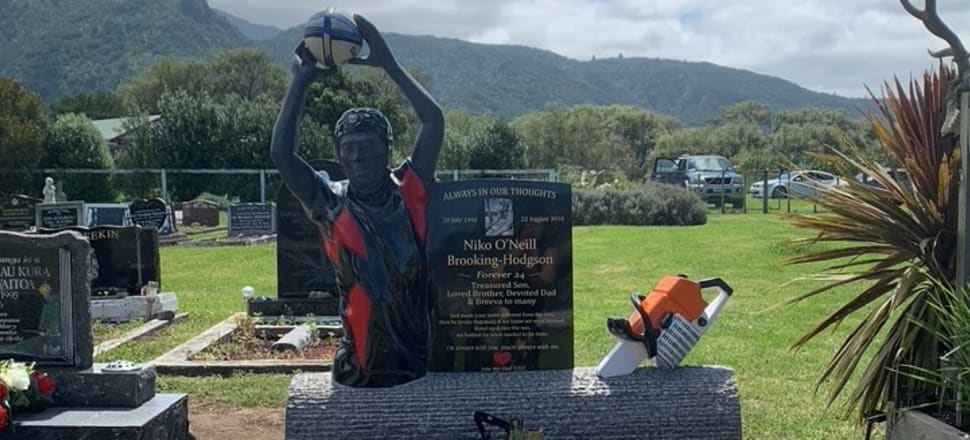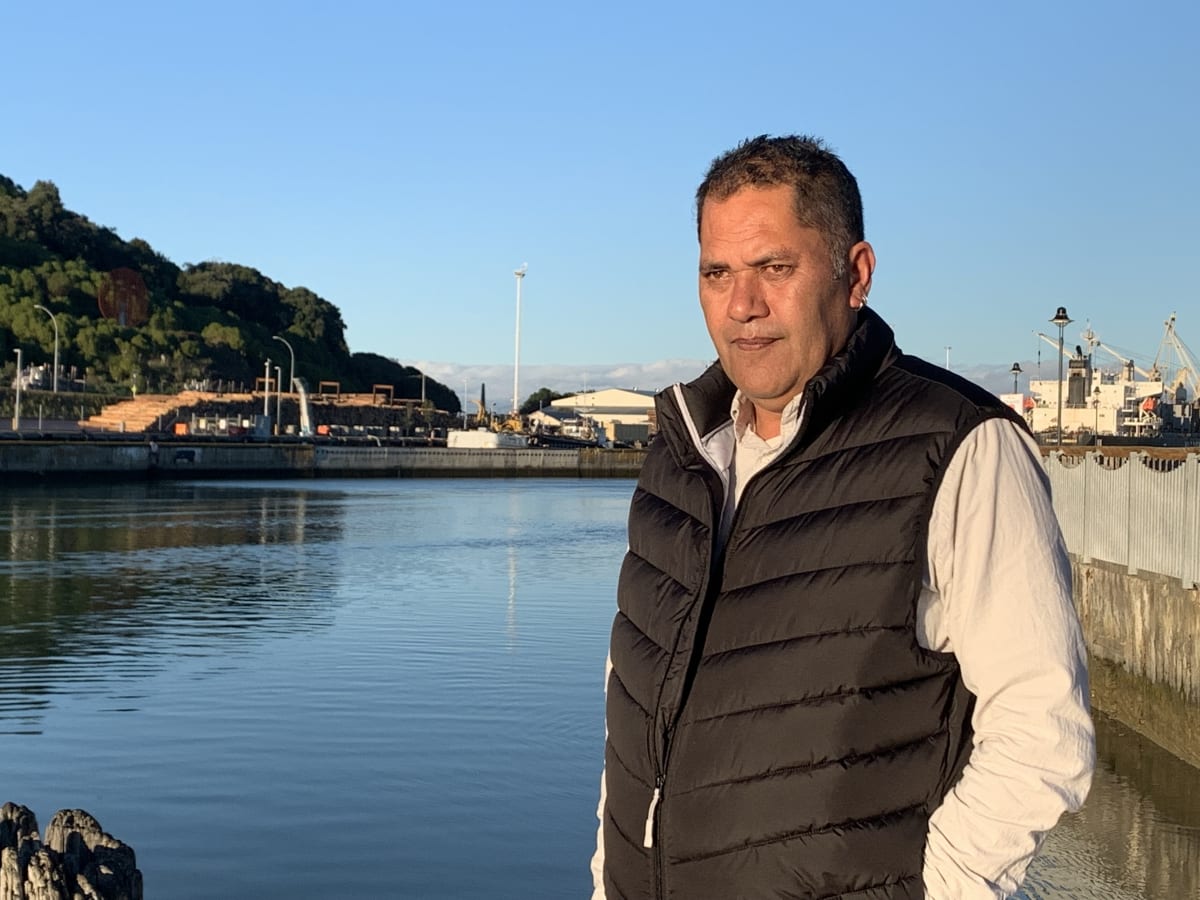
A Tairāwhiti family has brought a rare private prosecution against a logging contractor over the workplace death of their son in a Hawkes Bay pine forest. Rebecca Macfie reports.
Seven years to the day – almost to the hour – after Niko Brooking-Hodgson died a violent death while working in a Pan Pac Forest Products plantation, his parents finally stood for their day in court yesterday.
The 24-year-old Ngāti Porou man – a skilled logging worker, talented rugby player and father of one – sustained catastrophic head and chest injuries from a flying 9kg metal shackle and haulage rope just before 11am on August 22, 2016.
Brooking-Hodgson did not die immediately. His workmates administered CPR in a desperate fight to save his life. But paramedics pronounced him dead at the scene, on a harvested hillside in Pohokura Forest in inland Hawkes Bay. A trainee working alongside him was also struck, but received only a glancing blow.
Niko’s parents, Richard Brooking and Luana Hodgson, who live in the tiny East Coast settlement of Te Araroa, have battled ever since to have the circumstances of his death contested in court. After WorkSafe twice declined to bring a prosecution under the Health and Safety at Work Act, Brooking was last year granted leave to bring a private prosecution under the legislation.
Private prosecutions are rare, but the forestry industry has attracted more than its fair share. Brookings’ litigation is the third time an employer in the sector has been prosecuted after the state regulator refused do so – the late trade union leader Helen Kelly brought two successful private actions against logging employers in 2016, under the old Health and Safety in Employment Act.
WorkSafe has always insisted that Brooking-Hodgson’s employer, D G Glenn Logging – which contracts to Pan Pac – had done all that was required of it under the law, and that there was no evidence to suggest an offence under the Health and Safety at Work Act had been committed.
Richard Brooking fought long and hard for a coroner’s hearing into his son’s death, which was held in Gisborne in mid-2021. By that time, Niko Brooking-Hodgson was just one of more than 50 workers killed since 2015 across the forestry industry supply chain, including seven in the Tairāwhiti area alone. Among those victims were Niko’s cousin, Piripi Bartlett, who died almost exactly a year later. The cousins lie next to each other in the urupa at Te Araroa’s Paerauta Marae.

Following the publication of Coroner Donna Llewell findings , the Brooking-Hodgson family petitioned WorkSafe to reopen the investigation into D G Glenn, and to bring a prosecution. They argued the inquest unearthed relevant new evidence that justified this.
But WorkSafe remained convinced there was insufficient evidence of an offence having been committed by the employer. In a letter from WorkSafe CEO Phil Parkes in March last year, the regulator also said it was unlikely health and safety charges against D G Glenn would meet the the Solicitor General’s prosecution guidelines.
The family’s last chance was to bring a private prosecution. The way they see it, WorkSafe’s failure to litigate carries the implication that their son – who, the court heard yesterday, regularly rated 99-100% in workplace audits – was responsible for his own death. They want to clear his name and restore his mana.
District Court Judge Geoff Rea last year granted leave for them to do so. The charging documents are in Richard Brooking’s name, alleging offences have been committed under sections 48 and 36 of the Health and Safety at Work Act, with a maximum penalty of $1.5 million.
Opening proceedings in the Napier District Court yesterday, Fletcher Pilditch KC – acting pro bono for Brooking – outlined the allegations against the company, including the failure to take practicable steps in relation to the particular task that Brooking-Hodgson was involved in when the rope and shackle broke free from a snag or obstruction, and became a lethal missile.
Brooking-Hodgson worked as a “breaker-out” – a worker who attaches strops to felled trees, so that they can be dragged or lifted up to a skid (loading) site. On August 22, 2016, his crew had completed felling and breaking out an area of forest, and were involved in line retrieval – a process in which the haulage rope is wound back in from the harvested area by the hauler machine located on the skid, so that the set-up can be shifted to a new area. Brooking-Hodgson and the trainee breaker-out were over 300m away from the hauler, across a valley, and out of sight of the hauler operator.
Pilditch told the court the employer failed to take practicable steps, including hazard identification and risk assessment in relation to the line retrieval task; to ensure each worker had radio transmitters (Brooking-Hodgson had an RT, but not the trainee); to ensure workers established “positive affirmation” of a proposed course of action before embarking on that action – in this case, continuing to haul in the metal rope, despite the lack of affirmation from Brooking-Hodgson who, with the trainee, were exposed to the greatest risk; and failing to train workers on alternative communications if the primary form failed.
“Faced with this particular situation, there appeared to be, the prosecution says, an absence of protocol, and an absence of requirement within the company’s manuals and protocols, for ensuring that the two parties to resolving the issue of the snag knew and were aware what each other was doing; and in relation to the breaker-outs, who were in the vulnerable position relative to the hauler operator, that the hauler operator knew where they were and that they were in a safe location,” said Pilditch.
When the snag occurred there was “some degree of confusion about what was to happen and who was to do what,” said Pilditch. “And effectively [Brooking-Hodgson]... because of the tension that was being applied to the line, was effectively in the firing range of the loose part of the cable.”
This, said Pilditch, was the “pith” of the charge. “It is not an exercise in hindsight.”

The court heard yesterday from WorkSafe inspector Casey Broad, a former detective constable who had been at WorkSafe less than two years when he became the lead investigator into Brooking-Hodgson’s death. Cross-examined by D G Glenn lawyer Chris Shannon, Broad said Brooking-Hodgson was found to be in the “bight” of the rope, which is recognised as a dangerous position. He said both D G Glenn’s risk controls and the Best Practice Guidelines for Cable Logging stipulated that workers were not to stand in the bight.
Two of Brooking-Hodgson’s co-workers also gave evidence under summons, with a third to appear tomorrow. Pilditch sought name supression for all three, on the basis that naming them would cause “undue hardship” in the context of the trauma they suffered as a result of their workmate’s death. Judge Rea granted interim suppression, to be made permanent at the end of the trial in the absence of any objection from the media.
Much of their evidence related to detailed descriptions of their work, and in particular the process of line retrieval – described by one as “a simple process... I’ve never seen anything of this sort happen”.
One described reaching Brooking-Hodgson after the accident and finding him still conscious. He said Brooking-Hodgson kept “moving and fighting. We were trying to keep him still...we were just trying to keep him comfortable, but he was just trying to move around”. The worker estimated that by the time the paramedics arrived, Brooking-Hodgson had moved “maybe four or five metres” downhill.
At the end of the first day of the trial, Judge Rea acknowledged it was seven years exactly since Brooking-Hodgson’s death, and invited those present in court to participate in a moment’s silence.







